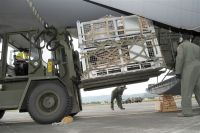RAMSTEIN AIR BASE, Germany, Aug. 17, 2010 — Two C‑130J Super Hercules transport aircraft flew missions from here into Russia on Aug. 13, delivering firefighting supplies promised by President Barack Obama to aid in the battle against rampant wildfires.
Members of the 37th Airlift Squadron delivered equipment from Army, Air Force, Marine Corps and Navy units throughout U.S. European Command.
Eucom officials began brainstorming about a week before the operation on how the command could help after the Russian government forwarded a list of equipment they needed to officials at the U.S. embassy in Moscow.
“Our smart planners worked with all of our components in Europe to rapidly determine what we could supply,” said Air Force Maj. Gen. Harold Moulton, Eucom’s operations director. “We identified supplies like Pioneer Equipment, large-diameter hoses, mobile pumping stations, personal protective equipment and medical kits, and then packaged them for delivery.
“We reached out to our bases as far west as Rota, Spain, and as far south as Sigonella, Italy,” he continued. “Additional materials were identified from our stocks in Norway and at our air base at Ramstein. We asked our air component, U.S. Air Forces in Europe, to lead, and they did a great job. Our C‑130 aircrews demonstrated their flexibility and ‘get it done’ attitude.”
The U.S. response to the Russian wildfires was a quickly pushed mission, and crews were ready to spring into action, said Air Force Lt. Col. Tobias Sernel, 37th Airlift Squadron and mission commander.
“Support from the embassy in Moscow made it possible to get our crews and equipment up in the air in incredible time,” Sernel said.
“It was a tiring mission with two roundtrip flights, more than 17 hours of flight time, and hours of loading and offloading equipment,” he added. “But when you consider the lifesaving equipment delivered and the bilateral relationship that was bolstered, doing all this was worth the effort.”
The mission was “incredible” from all perspectives, said Air Force Master Sgt. Keith Houin, USAFE public affairs documentation team leader. “It was impressive to see the orchestration of hundreds of airmen, two nations and so much equipment on such short notice. Anyone who touched even the smallest piece of this mission should be proud of what they did. We showed the world that the United States is a great partner.”
Source:
U.S. Department of Defense
Office of the Assistant Secretary of Defense (Public Affairs)

 von
von 
